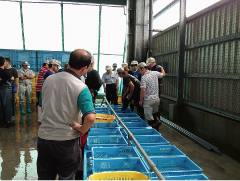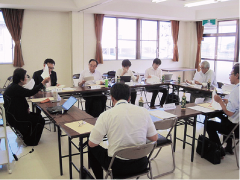Striving to become a University that contributes to Core Human Resource Development and a Generation of Vitality in the Local Community.
Based on its fundamental principles of "student-centered education" and "research and local contribution efforts that vitalize the region", Iwate Prefectural University aims to educate human resources key to local businesses and contribute to the vitalization of the local community.(Second phase midterm goals and midterm plan)
Student-centered education
Since our aim is to be "a university that increases student motivation", our programs include a solid education in liberal arts, meant to foster the students' understanding of human nature, as well as specialized education that stimulates active learning. Moreover, by providing volunteering opportunities and programs for the development of work skills, we place an emphasis on nurturing vigorous, independent individuals who can identify and solve problems.
- [Education to promote students' own identities]
- Regional Involvement Program
- To face the regional problems and heighten a strong sense of purpose and passion for learning.
- The prefectural university which has a policy of "University with the Community" and engages in educational and research activities along with the community. In order to advance this even further, we started the "Regional Involvement Program" in 2014 mainly for freshman and sophomore students as a pre-stage of promoting the educational activities facing the community.
This is for students to learn about the community through the overnight field-work by visiting various areas of the prefecture. The purpose is to create the opportunity for voluntary and active "Learning" by experiencing the current situation and problems of each community and considering the solutions to the problems.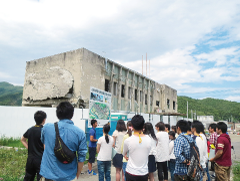
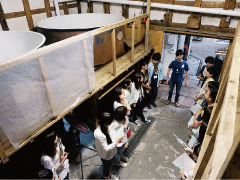
- [Strategies in order to develop students' employability]
IPU-E Project
- We are enhancing the employability through voluntary activities.
- "IPU-E Project" was started with a goal of enhancing the employability required in real life. With it the university will, through the financial aid and operational advices, support projects which are planed and conducted as groups by students.
Utilizing this program, students will not only expand their activities in various fields such as regional exchange, regional revitalization, earthquake reconstruction and introducing new technologies, but also gaining precious experience and knowledge by independently proposing, planning, conducting their projects with freedom to associate with various people in and out of the university.
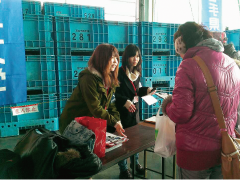
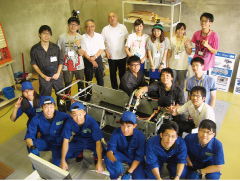
【Research and local contribution efforts to vitalize the region】
As a "hub of knowledge", IPU is performing various activities in order to vitalize the local community, such as creating new assets through Industry-University-Government Collaborations, strengthening its function as a think tank for local issues, and providing learning opportunities to the citizens of the prefecture. Furthermore, as part of its efforts towards reconstruction after the Great East Japan Earthquake and Tsunami, IPU has been engaged in support activities and reconstruction research which fully utilize our intellectual resources and academic specialties; through such efforts, we aim to gain the confidence of the local community to an even higher degree.
- [Industry-University-Government Collaborations]
- Regional society is being invigorated through research activities that go beyond their narrow domains.
-
In April 2011, the Iwate Monozukuri and Software Integration Technology Center (i-MOS) and the Center for Regional Policy Studies were set up in the Regional Cooperation Building.
i-MOS was established with the aim to create new innovations and to become a center of the industrial agglomerations by integrating the software research of IPU and the manufacturing technology which Iwate prefecture is proud of. We are engaged in promoting the research based on "the Next-Generation Intelligent Information Technology", nourishing technicians with sophisticated skills for manufacturing, supporting prototype developments, as well as performing the function of liaison to match the industry and academia, and also to secure research funds.
The Center for Regional Policy Studies functions as a think tank responsible for dealing with regional issues involving the citizens of Iwate prefecture, as well as for reinforcing the bonds between the industries, various organizations, and administrative agencies. We are making efforts to use the results of our research to serve the local communities by providing advice based on empirical research, deploying lecturers, and holding symposiums.
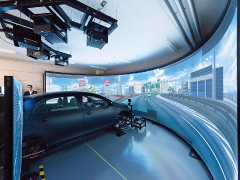


- [Support for the total reconstruction]
- Reconstruction support by utilizing IPU's Intellectual property and human resources.
-
IPU opened up its facilities immediately after the Great East Japan Earthquake and Tsunami of March 11, 2011, providing accommodation for students and collecting information.
Moreover, in April right after the earthquake, we have visited 11 coastal communities affected by the tsunami in order to explain our support systems. We have been continuously providing support with expertise of each faculty and teaching staff based on the requests from disaster affected areas.
On April 5, 2011, Disaster Recovery Support Center was established as a general center for inquires concerning volunteer activities involving students and teachers as well as deployment of teaching staff. Furthermore, the Disaster Reconstruction Support Center was established within the Center for Regional Policy Studies, and research has begun on 15 topics in the three fields of living, industry and economy, and society/lifestyle infrastructures.
"Progressive Reconstruction and Recovery Project Research from the Great East Japan Earthquake and Tsunami" was launched in 2014 and has been advancing since, so that we can take on research projects which directly contribute to the recovery of affected areas for many years on a large scale.
